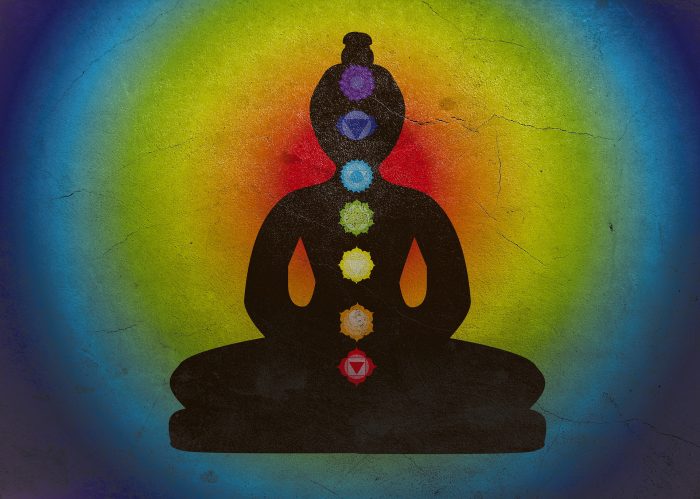The main seven chakras are energetic epicenters that carry energy, prana, emotions, memories, and beliefs.
They start at the base of the core and go to the crown of the head.
Chakra in Sanskrit means wheel or cycle. The chakras are designed to move energy, staying open and aligned. If they are closed or blocked, physical, mental, emotional, and spiritual issues can occur.
When exploring self-healing and spiritual well-being, it is important to connect with the chakras and work with their energy in order to become fully connected, balanced, and free.
Root Chakra
The Root/Muladhara chakra is where our connection to the physical earthly world begins, and it gives energy to all the other chakras. It is our sense of security and groundedness, where we feel supported and safe.
Muladhara in Sanskrit means “root base” and is the foundation of the physical body, lying at the base of the spine. It relates to our basic primal needs and is essential for our ability to survive and thrive.
When the root chakra is balanced, a person experiences confidence, trust, stability, strength, and energy.
When it is blocked, a person can experience fear, anxiety, distrust, disconnectedness, and an inability to bring vision into form. They have difficulty taking action and manifesting their work in the world.
The root chakra is represented by the color red and the earth element.
Practices for opening and healing the root chakra:
>> Yoga postures that are grounding and strengthening: corpse pose, sun salutation, child’s pose, tree pose, warrior II, mountain pose, malasana, lotus
>> Play in nature: lie on the earth and feel her holding you; relax into her love
>> Self-care practices: daily routine self-love, ayurvedic warm oil massage, massage the feet before bed with oil
>> Essential oils: sandalwood, vetiver, frankincense, cedarwood
>> Practice positive affirmations: “I am safe”
>> Connecting to earth element, opening the flow of prana: breathing technique—nadi shodhana/alternate nostril breathing
>> Chant the sound Lam; extend the sound out, llllaaaammmm, allowing it to vibrate
Sacral Chakra
The Sacral/Svadhisthana chakra is the center for creativity, pleasure, and sensuality. Its symbol has a crescent moon, connecting it to the phases of the moon, water tides, and the cycles of birth, death, and rebirth. This is where we cultivate our enjoyment for life and find our capacity to feel harmonious in our inner and outer world.
Svadhisthana in Sanskrit means “where your being is established” or “one’s own home or dwelling place.” Here, we foster our sense of self-acceptance, intimacy, creative offerings, our work in the world, what we birth in this lifetime with higher purpose.
When it is balanced, we create healthy relationships, enjoy self-care practices, and find enjoyment in pleasure and creativity. This energy supports freedom in expressing emotions, needs, and healthy boundaries—because you are sourced from your own inner truth and love.
When it is blocked, physically you may experience lower back pain, painful intercourse, and other lower abdominal issues. Emotionally, you have a difficulty expressing your own pleasure with life, have low self-esteem, a tendency toward secrecy, you may be stuck in the wounded inner child, have a fear of judgement, and you may have repressed sexual intimacy.
The sacral chakra is represented by the water element and radiates the color orange.
Practices for opening and healing the sacral chakra:
>> Yoga postures that are grounding and opening: camel pose, malasana, happy baby pose, hero pose, pigeon, and low lunge.
>> Indulge in self-care practices = self love: ayurvedic warm oil massage
>> Get your creative juices flowing
>> Essential oils: sandalwood, ylang ylang, jasmine, lavender, clary sage
>> Practice positive affirmations: “I trust myself”
>> Sing, dance, be playful
>> Chant the sound Vam; extend the sound out, vvvvaaaammmm, allowing it to vibrate
Solar Plexus
The Solar Plexus/Manipura chakra is where your power, self-confidence, and personal will resides. This energetic center influences digestion and transformation, how we assimilate information and turn it into action.
Manipura in Sanskrit means “the city of jewels” and represents your own personal treasure box. This is your power house, allowing you to move with confidence, courage, and clarity.
When it is balanced, one feels empowered and connected to their life purpose with the courage to manifest their calling.
When it is blocked, emotions tend toward self-doubt, mistrust, and worry. There can be digestive issues such as constipation, malabsorption, eating disorders, and ulcers. When it is overactive, the personal will overpowers the heart chakra and one moves more from fear, has a need to control, is overly rigid, and is disconnected from their inner intuitive guidance.
The Solar Plexus chakra is represented by the fire element and radiates the color yellow.
Practices for opening and healing the Solar Plexus chakra:
>> Yoga postures that are invigorating and core igniting: boat pose, warrior II, chair pose, crescent lunge, high plank, downward dog
>> Connect with the radiance and warmth of the sun
>> Essential oils: cypress, cedarwood, juniper, ginger, peppermint
>> Practice positive affirmations: “I honor the power within me”
>> Breathwork: try breath of fire to purify body, mind, and spirit
>> Chant the sound Ram; extend the sound out, rrrraaaammmm, allowing it to vibrate
Heart chakra
The Heart/Anahata chakra is where the physical and spiritual connect, the bridge between inner and outer world, between the upper three and lower three chakras, unifying mind, body, and spirit.
Anahata: in Sanskrit means unstruck or unhurt, where we are always and already whole, unconditional love, pure human consciousness, not sexual or pleasure love but inner pure love, the experience of being love, our true nature, acceptance, compassion, and inner peace.
The heart chakra can be open or blocked. It needs more support from the lower three chakras: the need to feel safe, connected, powerful, and purposeful.
When the heart chakra is out of balance or blocked, we have a tendency toward: anger, grief, a heavy feeling in chest, fear, self-critical thoughts, jealousy, social anxiety, feeling disconnected, feeling alone, feeling distrusting, unprocessed trauma, and a tendency to hide issues in the chest area.
When the heart chakra is open, we have a tendency toward: receiving and giving love, acceptance, connection to higher self, connection to intuitive guidance, inner freedom and stability, being compassionate toward yourself and others, trusting in your divinity and a sense of presence.
The heart chakra is represented by the color green and the air element.
Practices for opening and healing the heart chakra:
>> Yoga postures that open the front body: cobra pose, camel pose, cat cow, forward bend, fish pose, eagle pose, back bends
>> Play in nature: connection to life, to fresh prana (air element), taking in the color green
>> Self-care practices: daily routine for self-care, practicing self-love, nourishing and soothing
>> Essential oils: sandalwood, rose, lavender, ylang ylang
>> Practice positive affirmations: “I am love”
>> Ayurvedic hridaya basti: dough dam designed to contain warm herbalized oil to one location, deeply penetrating and nourishing, helps to relieve pain and tension, opening up the energetic flow, bringing warmth and healing
>> Connecting to air element, opening the flow of prana: breathing technique—nadi shodhana/alternate nostril breathing
>> Chant the sound Yam, extend the sound out, yyyyyaaaaaammm, allowing it to vibrate
Throat Chakra
The Throat/Vishuddha Chakra is the energetic center that influences your ability to communicate, self-express, and speak your truth. This is where the inner voice comes through, connected to clarity, compassion, and truth.
Vishuddha in Sanskrit means “purification” and is the expression between the upper and lower chakras. Here resides your connection to higher awareness, your basic needs, and the ability to speak them.
When it is balanced, one feels empowered and connected to their truth, able to communicate their needs, emotions, and wisdom.
When it is blocked, emotions tend toward low self-esteem, anxiety, and depression. There can be physical issues such as TMJ, sore throat, thyroid issues, or sinus infections. When it is overactive, someone might talk too much without clear direction.
The Throat Chakra is represented by the ether element and radiates the color blue.
Practices for opening and healing the Throat Chakra:
>> Yoga postures that open the neck: camel pose, fish pose, shoulder stand, upward facing dog, cat/cow, cobra
>> Use your voice: chanting, singing, screaming, open up the pathways to express yourself
>> Essential oils: blue chamomile, frankincense, peppermint, geranium
>> Say positive affirmations out loud: “I speak my truth”
>> Breathwork: allow the prana to flow through the throat chakra with lion’s breath or Ujjayi breath
>> Chant the sound Ham, extend the sound out, hhhhaaaammmm, allowing it to vibrate
Third Eye Chakra
The Third Eye/Ajna Chakra is the energetic center that influences your intuition, clarity, and spiritual perception. This is where our soul vision supports our human journey through higher wisdom.
Ajna in Sanskrit means “the seat of intuition” and is connected to higher wisdom, seeing with the soul’s eye to guide your path.
When it is balanced, one feels clear, connected, and able to follow the soul’s vision and higher wisdom.
When it is blocked, emotions tend toward worry, self-doubt, and one is unable to connect to higher purpose. There can be physical issues such as headaches, tension in the brow area, sinus issues, and dizziness. There can be dissociation and disturbed sleep due to the ungrounding sense of disconnect and the unknown.
The Ajna Chakra is represented by the light element and radiates the color indigo.
Practices for opening and healing the Third Eye Chakra:
>> Yoga postures: child’s pose, head stand, wide legged forward bend, dolphin pose, legs up the wall, puppy pose
>> Meditate on your Third Eye by bringing your inner awareness to its inner location between your brows, imagining light illuminating through it
>> Essential oils: lemon, clary sage, cypress, frankincense, helichrysum, juniper
>> Say positive affirmations: “I am open to my inner wisdom”
>> Breathwork: inhaling light energy, allowing it to circulate up through the core to the third, expanding, then exhaling what does not serve you; also, alternate nostril breathing
>> Chant the sound Om, extend the sound out, oooommmm, allowing it to vibrate
Crown Chakra
The Crown/Sahasrara Chakra is the energetic center that connects you to higher consciousness where you transcend the ego and open to spiritual enlightenment. This is where we experience clarity, understanding, and peace.
Sahasrara in Sanskrit means “infinite” or a “thousand petals” and is connected to the brain, memory, nervous system, and intelligence.
When it is balanced, one feels clear, connected to higher wisdom and spiritual guidance.
When it is blocked, one experiences selfishness, lack of motivation, disconnection, and spiritual ignorance. There can be physical issues such as headaches, mental fog, and delusions.
The Sahasrara Chakra is represented by the thought element and radiates pure white light and violet.
Practices for healing and opening the Crown Chakra:
>> Yoga postures: headstand, rabbit pose, child’s pose, savasana, lotus, mountain pose, tree pose
>> Meditate on your Crown Chakra by bringing your inner awareness to the crown of your head, imagining light illuminating to the heavens
>> Essential oils: lavender, vetiver, rose, frankincense, sandalwood, neroli
>> Say positive affirmations: “I am guided by spirit”
>> Breathwork: try alternate nostril breathing, balancing left and right brain, allowing panic energy to circulate through all the chakras
>> Chant the sound Aum; extend the sound out, aaaauuuummmm, allowing it to vibrate
~
Please consider Boosting our authors’ articles in their first week to help them win Elephant’s Ecosystem so they can get paid and write more.












Read 10 comments and reply